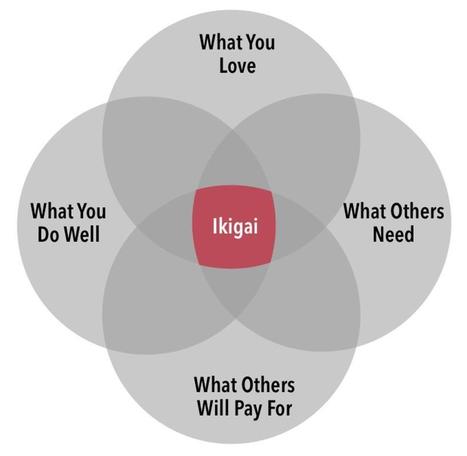 Your new post is loading...
My great-grandparents, Cleve and Zelma Carder, lost almost everything they owned during the Dust Bowl years. After losing their homestead and ranch, they packed what they could into a Conestoga Wagon and made the trek from Northern New Mexico to find work picking cotton in the fields of Oklahoma. When my great-grandmother told me stories of those difficult times, it wasn't with bitterness or anger. She would laugh as she recalled her husband's refusal to remove her grand piano from their wagon, despite the fact that it weighed over 1000 pounds. Instead, the family would spend several hours digging the wagon free from the sand in the dried-up riverbeds that they crossed. In the last years of her life, her strongest memories were not of her failures or disappointments but of the love and hope experienced within them. I am grateful to her for helping me learn at an early age that we get to choose how we view our circumstances and how we let them affect our mindset.
Via The Learning Factor
We love talking about what millennials know. As a group that’s become the dominant force in the workforce, we applaud their smarts on tech, social media, and even the age-old practice of branding. Yes, millennials might arguably be one of the overall most intelligent generations to come around. However, that’s not to say they still don’t have a lot to learn, especially when it comes to face-to-face communication. As the generation that grew up with communication becoming more efficient via digital, their biggest strength could also be a critical weakness. While the way they say things has become more direct, their messages sometimes lack. Why? Because as one of the first to grow up in a digital world, they’ve been afforded a privilege not found in our day-to-day.
Via The Learning Factor
All job hunters hear the advice to “stand out,” “be different,” and “separate yourself from the crowd.” But what exactly does that mean with regard to your job search? Do you send a fruit basket to your interviewer? Record a video of a company cheer you composed? Or maybe you just try to be your “best self”—whatever that means! Here’s the scoop: You will face competition when applying to most jobs, so the greater the gap you create between you and your fellow applicants, the better. But it’s important to remember that there’s a right way to stand out and a wrong way.
Via The Learning Factor
When I look back on my 20s, I see two different versions of myself. The first five years were dominated by feelings of insecurity and anxiety. I was living a life I did not want, and I wasn't confident enough to stop it. Then, in the second half of my 20s, I learned to embrace my purpose and began living the life I wanted -- the life of an entrepreneur. One thing is clear: The success I've experienced while launching and growing SkyBell would not have been possible with my old mindset. Now at age 32, I can clearly see my shift from a negative mindset to a success mindset was caused by my developing more confidence. When you feel confident, the whole world seems to belong to you. You suddenly surround yourself with other successful and confident people, and both opportunities and success come your way with ease. Here are 10 ways you can develop the mindset shared by the most confident people.
Via The Learning Factor
When you're eager or even desperate to get a new job, it can be hard to remember how the wrong job can hurt your career -- but it's imperative to do so! Here are five ways the wrong job can damage your resume and your mojo.
Via The Learning Factor
Self-help advice isn’t exactly in short supply. There are research-backed tips out there for boosting confidence, resilience, risk taking, and adaptability. The message is pretty clear: Feel better about yourself or change your beliefs about what you’re capable of, and you’ll excel. Indeed, ample scientific evidence supports each of these claims. Nevertheless, most self-improvement strategies focus too much on the person who’s trying to do the improving. Much of the time, the same outcomes you’re trying to achieve by changing your own habits, attitudes, and behaviors depend on how you view other people.
Via The Learning Factor
Don't wait until the week before your annual review to start collecting data and anecdotes that demonstrate your worth.
Via The Learning Factor
Life isn’t linear. No matter how well thought out your plans, they’ll eventually collide with a reality you didn’t plan on. Learning to "lean into the curves" when life doesn’t unfold as you’d hoped will help spare you untold stress, bounce back faster and emerge better off. Here’s five ways to do just that.
Via The Learning Factor
|
“I am sick to death of the ridiculous situations I have to deal with at work. The pettiness, the politics, the stupidity — it’s out of control. This kind of thing stresses me out to the max.” Stress is a happiness killer. And life is just too short to be unhappy at work. But we hear this kind of thing all the time from leaders in industries as varied as financial services, education, pharmaceuticals, and health care. In our coaching and consulting, we’re seeing a spike in the number of leaders who used to love their jobs but now say things like, “I’m not sure it’s worth it anymore.” They’re burned out — emotionally exhausted and cynical, as a result of chronic and acute work stress.
Via The Learning Factor
Ever wondered what the best bosses whisper to their employees to get them motivated and glad to be working every single day? Here's your chance to find out.
Via The Learning Factor
Do you ever stop to consider what it means to think openly? Wasn’t that your basic education at school and what your parents told you to do? Whatever happened to that? The question is important because today, more than ever, we are urged to be creative in our jobs. If you cannot think openly, how can you be creative? From birth our parents persistently encouraged us to think for ourselves. It was non-stop; a barrage of parenting tips that were designed to help us become independent, confident and open thinkers.
Via The Learning Factor
For fifty or sixty years job-seekers have been taught to write their resumes in the most opaque and unhelpful way imaginable. Job-seekers have been taught to use terse, governmental language in their resumes, so that almost every job-seeker sounds identical to every other job-seeker! That's the worst possible approach. You are not a dry, dusty person — you are lively and creative! Why not show some of that creativity and spark in your resume?
Via The Learning Factor
Years ago, I hired an extremely intelligent, Ivy League-educated professional who was highly motivated to work for our organization. He worked until 9 p.m. every night and often left a proposal or report on my desk so it would be the first thing I saw the next morning. Each morning, I hoped for the best, but most days my reaction was a sad sigh. This well-meaning guy just didn't have the skills to be a product manager. Little that he produced was helpful, or even accurate. I never was able to figure out why, but no matter how much support and training we gave him, his work never improved significantly. Here's the good news: after we reluctantly let him go, he switched industries and became highly successful in a very different role.
Via The Learning Factor
I’ve been asked on a number of occasions the “secret” to harnessing mental toughness to overcome adversity. The “secret,” I tell them, isn’t a secret but a fact that they don’t want to hear because it’s simple. But simple isn’t easy. That secret is this: make a decision and go with it. That’s it. I remember waiting for Hell Week to begin in BUD/S (Basic Underwater Demolition/SEAL training) and students asking the instructors—in a somewhat uncommon cordial setting—what the secret was to making it through five and a half days of constant, nonstop activity. Here’s what the instructors said, “The secret to making it through BUD/S, is knowing you’re going to make it through BUD/S.” It’s belief. You need to believe that you’re the type of person who has the skill and will to make that goal happen, and then make it happen. Don’t worry about what’s right and don’t wait for the perfect opportunity because “perfect” doesn’t exist—it’s an excuse to procrastinate.
Via The Learning Factor
The further along you are in your career, the easier it is to fall back on the mistaken assumption that you've made it and have all the skills you need to succeed. The tendency is to focus all your energy on getting the job done, assuming that the rest will take care of itself. Big mistake. New research from Stanford tells the story. Carol Dweck and her colleagues conducted a study with people who were struggling with their performance. One group was taught to perform better on a task that they performed poorly in. The other group received a completely different intervention: for the task that they performed badly in, they were taught that they weren't stuck and that improving their performance was a choice. They discovered that learning produces physiological changes in the brain, just like exercise changes muscles. All they had to do was believe in themselves and make it happen. When the groups' performance was reassessed a few months later, the group that was taught to perform the task better did even worse. The group that was taught that they had the power to change their brains and improve their performance themselves improved dramatically.
Via The Learning Factor
Life isn’t linear. No matter how well thought out your plans, they’ll eventually collide with a reality you didn’t plan on. Learning to "lean into the curves" when life doesn’t unfold as you’d hoped will help spare you untold stress, bounce back faster and emerge better off. Here’s five ways to do just that.
Via The Learning Factor
|



 Your new post is loading...
Your new post is loading...
































Disappointments are a part of life. Here are five tips for staying positive when things don't go our way.
nice